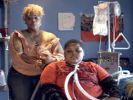Eye For Film >> Movies >> From One Second To The Next (2013) Film Review
For a director of artistically acclaimed documentaries to make a campaign film is generally frowned upon. There are relatively few such films that win critical respect, and they're not usually financed by mobile phone companies and designed to be shown in schools. But when Werner Herzog opts to take on such a project, it's worth paying attention. This may be a film with an agenda but it's also a superb piece of work.
The agenda is one that viewers are unlikely to disagree with. This is about persuading people not to text whilst driving. As it's Herzog, there are not lectures and no cute graphics. Some of the director's customary distance remains. Instead there are a series of interviews with car crash survivors, the bereaved, and those who caused crashes. It's a simple format but remarkably hard hitting.

Part of Herzog's genius has always been his ability to persuade strangers to tell their stories plainly and directly, with not a hint of self-consciousness, providing unusually intimate access to their lives. Here we begin with a mother whose son was left severely disabled after being hit by a car as he crossed the road. She describes her grief at the loss of the life they knew and of the future she had imagined for him. It's a simple tale - the world holds many like it - but we see her clearly as a human being. The interview never touches directly on the most frightening aspect of her situation - the fact that she'll be caring for her son for the rest of her life and there may be nobody to provide for him when she's gone. What is absent in these tales is every bit as potent as what we see.
This being Herzog, we see interviewees framed against wide landscapes; we visit an observatory where a young woman talks about how she used to look at the stars with her dad. The people here are tiny, helpless figures caught in something huge, something the director has referred to as a reshaping of society, yet their smallness makes them no less important. This is as much about mortality in general as it is about the specific phenomenon under scrutiny, but that in itself raises questions about selfishness, awareness of others, and the capacity for risk assessment. The film also presents a bleak vision of the US system of health and care, where a woman left with major cognitive problems after being hit by a car is almost $1M poorer as a result. Luck, here, is everything; human efforts to create a better world seem to have achieved little.
In this bleak scenario, that small beacon of hope that is the film's message shines far more brightly than might be expected, though it is rarely stated directly. If people can avoid taking this unnecessary risk, there will be fewer shattered lives like these. The despair inherent in the human condition may be mitigated only slightly, but it's worth the effort.
Reviewed on: 10 Aug 2013















